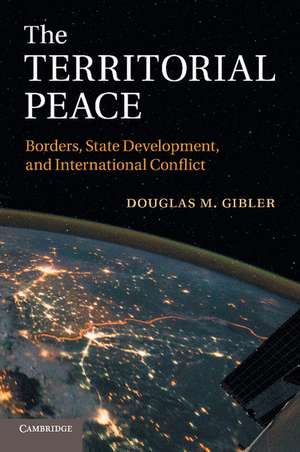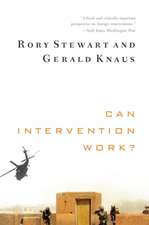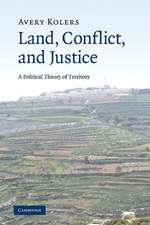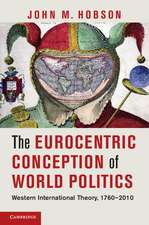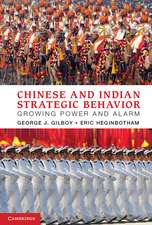The Territorial Peace: Borders, State Development, and International Conflict
Autor Douglas M. Gibleren Limba Engleză Paperback – 20 aug 2014
| Toate formatele și edițiile | Preț | Express |
|---|---|---|
| Paperback (1) | 280.53 lei 6-8 săpt. | |
| Cambridge University Press – 20 aug 2014 | 280.53 lei 6-8 săpt. | |
| Hardback (1) | 748.43 lei 6-8 săpt. | |
| Cambridge University Press – 12 sep 2012 | 748.43 lei 6-8 săpt. |
Preț: 280.53 lei
Nou
Puncte Express: 421
Preț estimativ în valută:
53.69€ • 55.84$ • 44.32£
53.69€ • 55.84$ • 44.32£
Carte tipărită la comandă
Livrare economică 14-28 aprilie
Preluare comenzi: 021 569.72.76
Specificații
ISBN-13: 9781107437241
ISBN-10: 1107437245
Pagini: 204
Ilustrații: 1 b/w illus. 13 tables
Dimensiuni: 152 x 229 x 11 mm
Greutate: 0.28 kg
Editura: Cambridge University Press
Colecția Cambridge University Press
Locul publicării:New York, United States
ISBN-10: 1107437245
Pagini: 204
Ilustrații: 1 b/w illus. 13 tables
Dimensiuni: 152 x 229 x 11 mm
Greutate: 0.28 kg
Editura: Cambridge University Press
Colecția Cambridge University Press
Locul publicării:New York, United States
Cuprins
1. Introduction; Part I. International Borders: 2. Territorial issues and international conflict; 3. Individual, state, and territorial issues; Part II. State Development: 4. Territorial threats and political behaviour; 5. Territorial threats, standing armies, and state repression; 6. Territorial threats and domestic institutions; Part III. The Territorial Peace: 7. Territorial peace among neighbours; 8. Territorial peace and negotiated compromises; 9. Territorial peace and victory in conflict; 10. Final thoughts.
Recenzii
'Existing research demonstrates that territorial issues often escalate to war and that violent conflict is rare between democratic states. Although these two findings tend to been seen as separate phenomena, Gibler argues that territorial issues shape state development and domestic politics; regional territorial threats foster political centralization, intolerance, and polarization, and the democratic peace emerges as a by-product of territorial peace. This insightful book is essential reading for all interested in the links between international conflict processes and domestic institutions and politics.' Kristian Skrede Gleditsch, University of Essex
'The Territorial Peace is one of the most important books I have read on international conflict in the past decade. Students of territorial conflict and the democratic peace will find this book both insightful and provocative.' Paul Huth, University of Maryland, and Editor, Journal of Conflict Resolution
'In tracing the complex and dynamic relationships between territorial disputes, domestic political centralization, democratic regimes, and international conflict, The Territorial Peace develops a novel and intriguing explanation for the near absence of war between democracies, and makes a powerful argument for the central role of territorial issues in international relations. Gibler engages some of the most central questions in the field, and all conflict analysts must deal with his argument.' Jack S. Levy, Board of Governors' Professor, Rutgers University
'The Territorial Peace is one of the most important books I have read on international conflict in the past decade. Students of territorial conflict and the democratic peace will find this book both insightful and provocative.' Paul Huth, University of Maryland, and Editor, Journal of Conflict Resolution
'In tracing the complex and dynamic relationships between territorial disputes, domestic political centralization, democratic regimes, and international conflict, The Territorial Peace develops a novel and intriguing explanation for the near absence of war between democracies, and makes a powerful argument for the central role of territorial issues in international relations. Gibler engages some of the most central questions in the field, and all conflict analysts must deal with his argument.' Jack S. Levy, Board of Governors' Professor, Rutgers University
Notă biografică
Descriere
Uses an innovative theory of state development to explain patterns of international conflict and democracy in the world over time.
